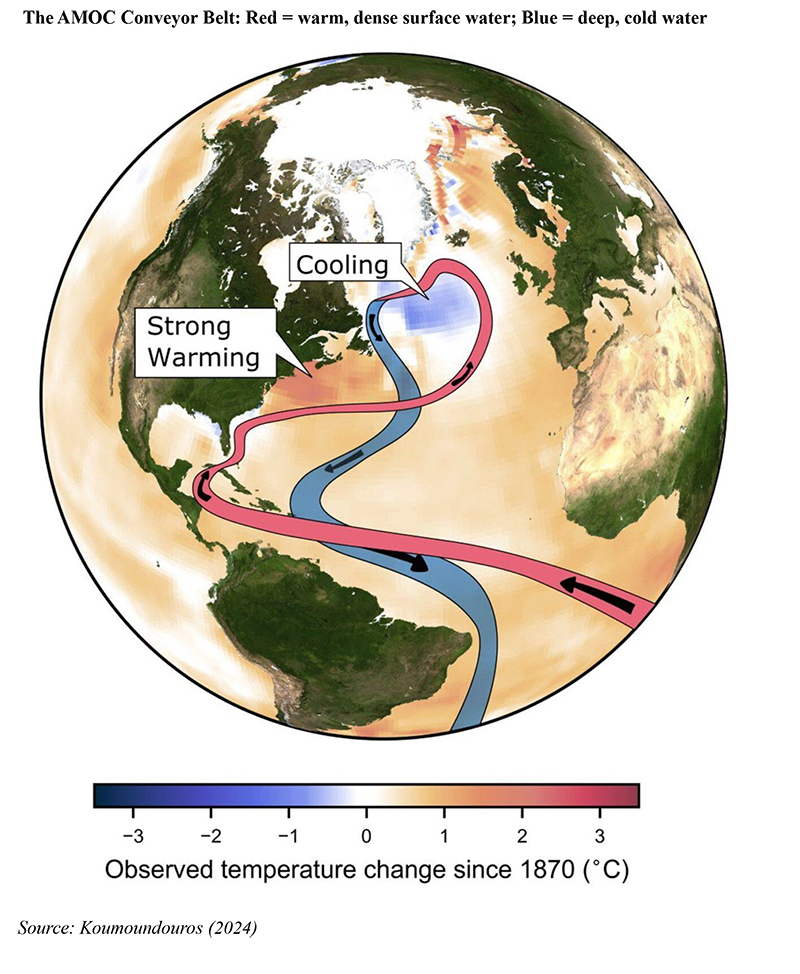Last month I discussed climate tipping points, i.e., increases in temperature that activate self-reinforcing changes in one of the earth’s climate systems, such as ice sheets. Cross a threshold and the ice sheet will melt until it is gone. Once considered highly unlikely, tipping points are now major concerns because improved understanding of global warming requires some tipping points to be cut from a global temperature increase of 5 degrees Celsius to about 1.5 degrees. At current greenhouse gas emissions, we will pass 1.5 degrees C by the early 2030s.
The Atlantic Meridional Overturning Current, or AMOC, is a crucial climate system. AMOC is massive; it moves 30 times more water than all rivers on terra firma. AMOC shuttles warm, salty, and dense tropical waters past the east coast of America and then up to Greenland and Iceland where it sheds its heat and becomes heavier than the cooler, less salty North Atlantic waters. The heavier water plunges to depths of more than 2,000 meters and then heads south. In essence, AMOC’s downwelling in the North Atlantic functions as a giant heat pump that continuously pulls northward warm surface water from the tropics. The heat that is released makes Britain and Northern Europe much warmer than they would otherwise be (Rahmstorf 2024).
What turns AMOC off? One switch involves freshwater melting into the North Atlantic. If large enough, the freshwater melt from ice sheets can slow down, even stop AMOC. Another switch involves changes in water salinity and temperature that can prevent downwelling of tropical water. Whatever the cause, “a full AMOC collapse would be a massive, planetary-scale disaster” (Rahmstorf 2024).
And the collapse’s effects would occur in several decades rather than several centuries or millennia. Temperatures in Northern Europe could drop as much as -4 to -10 degrees C. The size and speed of change would make human adaptation very difficult.
AMOC slowdown or collapse would add significantly to east coast sea level rise which, at great political, economic, and cultural cost, would reshape our shoreline. As Northern Europe becomes much colder, the southern hemisphere will become correspondingly hotter. And the transition zone between Northern Europe and warmer southern areas will experience weather instability due to a larger temperature gradient.
Africa will probably be hit the hardest because AMOC’s shutdown will move the African monsoon further south; it now brings rain for farming Africa’s continent-spanning savannah. As this once-farmable land mass turns into a dust bowl, Africa will face famine. Much of Britain and Northern Europe will also face grave difficulty adapting its farming to colder, dryer weather conditions.
Scientists disagree over the likelihood of an AMOC slowdown or collapse this century (Wikipedia 2024) even though the International Panel on Climate Change in 2021 assigned only “medium confidence” to AMOC maintaining its stability. Much disagreement involves disputes over our best climate models and whether they can capture AMOC turning points. It appears that some of these models cannot do so for past AMOC collapses. Moreover, some climate models were “repaired” when they generated AMOC collapses with existing climate data (Rahmstorf 2024). Given the high stakes, this is no way to run a planet. We need to be aiming for a 90% likelihood that AMOC will remain stable, and that will require all-hands-on deck to reign in greenhouse gas emissions
References
- Koumoundouros, Tessa. 2024 (Feb 13). It’s Confirmed. A Major Atlantic Ocean Current Is Verging on Collapse. Science Alert; https://www.sciencealert.com/its-confirmed-a-major-atlantic-ocean-current-is-verging-on-collapse
- Rahmstorf, Stefan. 2024a. Is The Atlantic Overturning Circulation Approaching A Tipping Point? Oceanography; https://tos.org/oceanography/assets/docs/37-rahmstorf.pdf
- Wikipedia 2024 (Oct 10).. Atlantic meridional overturning circulation. Wikipedia; https://en.wikipedia.org/wiki/Atlantic_meridional_overturning_circulation
- Zhong, Raymond. 2023 (Jul 250). Warming Could Push the Atlantic Past a Tipping Point This Century. New York Times; https://www.nytimes.com/2023/07/25/climate/atlantic-ocean-tipping-point.html?searchResultPosition=5



Recent Comments